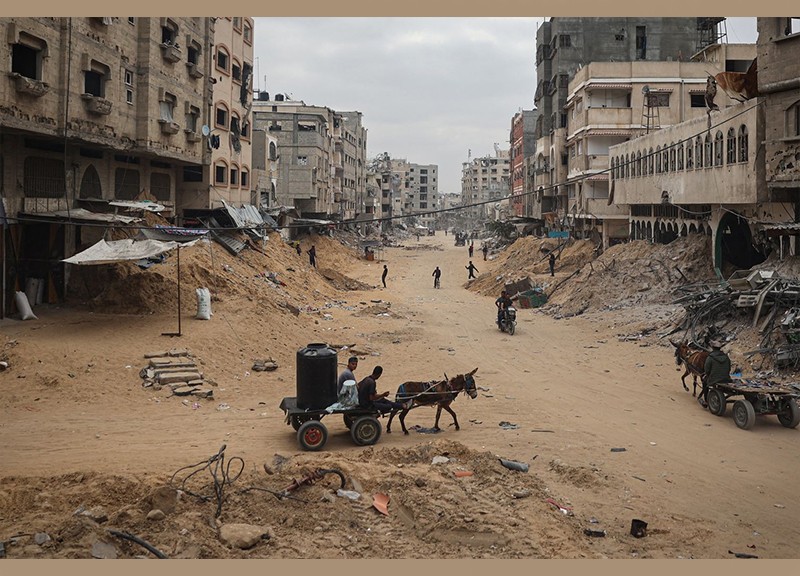
Calculations of both men, whose strategies leave little room for compromise, pose a challenge to Biden’s effort to free hostages
By Jared Malsin, Anat Peled and Summer Said. WSJ
The fate of a deal that would free Israeli hostages and stop the war in Gaza is now in the hands of two leaders whose future is at stake in the war: Israeli Prime Minister Benjamin Netanyahu and Hamas’s top leader in Gaza, Yahya Sinwar.
Netanyahu, who faced criticism within Israel over the security and intelligence failures around Hamas’s Oct. 7 attack that sparked the war, has seen his sinking polling numbers stabilize as the conflict drags on, despite the international pressure that is piling on him. He is now concerned about the possibility that the International Criminal Court could indict him for alleged war crimes, an outcome he has rejected as an assault on Israel’s right to self-defense. Stopping the fighting risks a political reckoning that could eventually push him from power.
Sinwar, who Israel believes is hiding in Hamas’s tunnels underneath Gaza, has survived Israel’s heavy bombardment and believes he can hold out even if Israel launches its threatened assault on the city of Rafah, Arab negotiators dealing with him say. He, too, could be indicted by the ICC. His ultimate aim, mediators involved in the talks say, is to secure the release of hundreds, if not thousands, of Palestinian prisoners in a swap for the hostages and secure a deal to end the war and ensure Hamas's survival. Sinwar is ex- pected to reject any deal that doesn't include a credible path to ending the war.
The calculations of both men, hard-liners whose war strategies have left them little room to reach a compromise, pose a challenge for the Biden administration, which has been working to free the hostages and secure a cease-fire. President Biden, under pressure within his party over the death and destruction in Gaza, is facing a tight re-election bid in November and discord on U.S. college campuses as students protest Israel's war in Gaza.
Negotiations over a cease-fire deal are at a critical point. The Israeli government has said it plans to send forces into Rafah, a city at the southern edge of the Gaza Strip where more than a million Palestinian civilians are sheltering. Rafah's border crossing with Egypt is also a lifeline for humanitarian aid to the peo- ple of Gaza, many of whom are on the edge of starvation. a difficult task. The Israeli Netanyahu says the operation is necessary to destroy Hamas's remaining forces.
In a sign of mounting international opposition to Israel's conduct in Gaza, Turkey said Thursday it was suspending trade with Israel until humani- tarian aid is allowed to flow un- interrupted into Gaza. Turkey, a member of the G-20 and NATO, was the first Muslim-majority country to recognize Israel after its founding in 1948.
Mediators say dealing with both Netanyahu and Sinwar is a difficult task. The Israeli prime minister wants to extend his decadeslong run as one of Israel's most dominant leaders. He survived nationwide protests last year against his attempt to diminish the independence of the judiciary and faces a continuing trial on corruption charges that he denies. Recent polls show a majority of Israelis want him to resign, but he likely believes his chances of political survival have improved since the early days of the war, some analysts say.
"He only has one aim and that's his political survival and that dictates everything. And that means there won't be any cease-fire-hostage deal if it's up to him," said Alon Pinkas, a former senior Israeli diplomat.
Sinwar has led Hamas in Gaza during a period in which it has built up its forces and strengthened ties with Iran. Since Hamas launched the Oct. 7 attack, he too has defied the odds, holding out as the Israeli military launched thousands of artillery and air- strikes on Gaza. Though Hamas's forces have been battered, he likely believes he and his organization can hold out for months and even years of conflict, some analysts say.
"Time, tunnels and hostages [are] giving Sinwar the feeling that he doesn't have to [do a deal]," said Aaron David Miller, a senior fellow with the Carnegie Endowment for International Peace, referring to the military advantage that the large underground network of tunnels has been for Hamas.
According to Arab mediators dealing with Hamas, Sinwar believes that he has already won the war, whether or not he survives it, by opening the world's eyes to the suffering of Palestinians and bringing the conflict to the forefront of global affairs.
In communications relayed by the military wing to Arab mediators, Sinwar indicated he feels time is on his side as international pressure builds on Israel. He is also banking on conflict within the Israeli government to eventually force Netanyahu from power.














